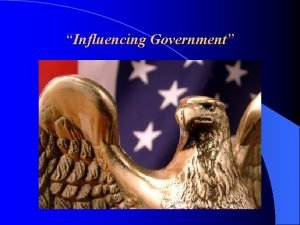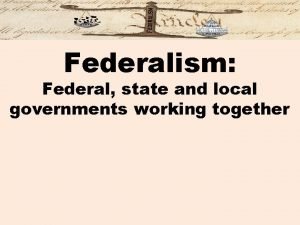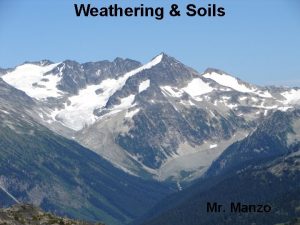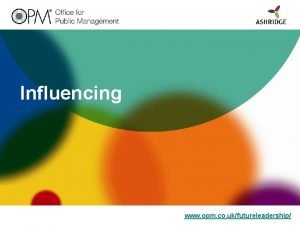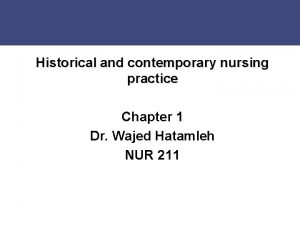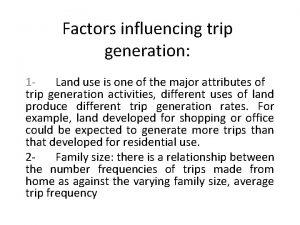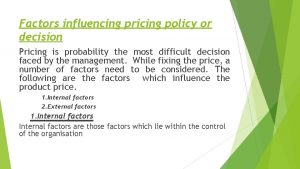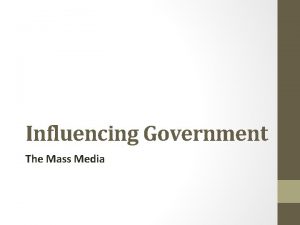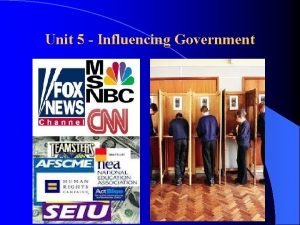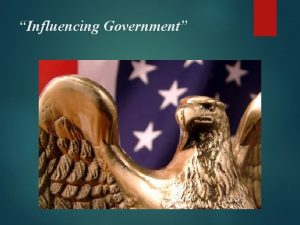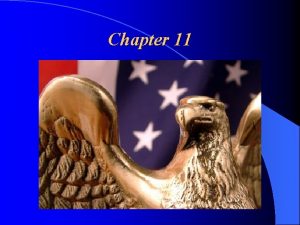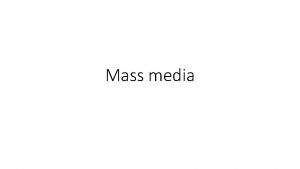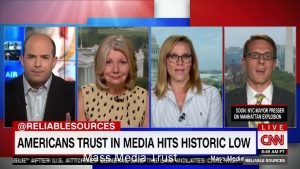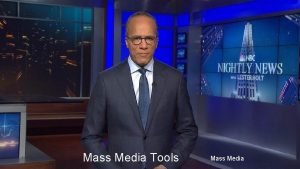Influencing Government The Mass Media The Mass Media











- Slides: 11

Influencing Government The Mass Media

The Mass Media What is the Mass Media? • Methods of communication that are used to reach a large portion of the population. Two Types of Media 1. 2. Print Media: magazines, newspapers, newsletters, and books Electronic Media: radio, television, and the internet What are the four roles of the media? 1. 2. 3. 4. Report the news Cover government officials (example: election campaigns) Help set the public agenda Serve as a “watchdog” or the government and over society

The Mass Media Who controls the media? • In some countries, the government strictly controls the various media outlets. Thus, they control what viewers see. • Media outlets included: TV channels, radio stations, newspaper publishers, etc. • In the United States, most of the media outlets are privately owned businesses. • Private businesses are run in order to make a profit. • Therefore, media outlets run news stories that they think will attract the most viewers, listeners, or generate the most circulation. • Larger audiences means that they can charge more money for advertisements.

The Media’s Impact How does the media influence the government? 1. By reporting the news the media helps to set the public agenda • Public Agenda: the issues which receive the most attention. • Time devoted to covering the issue, • Money donated to the address the issue, • The effort government officials give to addressing the issue. • The media can influence public opinion based on what issues are publicized and how they are portrayed. This is known as “spin. ” • Government officials pay close attention to public opinion in order to see which issues the people consider to be the most important. • By influencing the public opinion the media is able to help set the public agenda, which in turn allows them to influence the formation of various public policies.

The Media’s Impact How does the media influence the government? 2. By covering election campaigns the media can influence who is elected to office. • The media coverage of candidates: • Offers some candidates the ability to run for office who maybe have less experience. • Prevents other candidates from running for office or alters the publics opinion of the candidate because they do not come across well on camera. • Example: • In 1960, Nixon ran for president against John F. Kennedy. Nixon lost the race due to the fact that he did not come across well on camera. • During the first televised presidential debate Richard Nixon looked nervous on camera while Kennedy looked more in control.

The Media’s Impact How does the media influence the government? 3. By serving the role as a “watchdog” the mass media is able to alert the public about to any signs of waste or corruption both in the government and in the business sector. • Politicians sometimes “leak” information about proposed actions to friendly reporters in order to test the public’s opinion. • If the public’s reaction is favorable then they will proceed with the action but if it’s not favorable then politicians are able to quietly drop the issue. • Leak: the method of secretly passing on information. • The press use leaks in order to report “inside” information before their rivals; a technique known as scoop.

Media Safeguards • It has been said that freedom of the press is the cornerstone of any free society. • 1 st Amendment: “Congress shall make no law… abridging the freedom… of the press. ” 1. The U. S. Supreme Court has interpreted this to mean that the media are free from prior restraint. (the government cannot censor material before the media publishes it) 2. However, the law does prohibit the media from publishing false information that can harm someone’s reputation; if the media does, they are libel for damages. Public officials, however, must prove that the media knew the information was false or they recklessly disregarded the truth; known as malice. 3. Some state have shield laws which in some cases protect members of the media from being required to reveal their sources in court.

Regulating the Media • Given the limited number of airwaves available for television and radio in the United States, the government is able to regulate the electronic media by deciding who can broadcast. • What is the FCC? • The Federal Communications Commission is the agency that regulates the media. It makes the rules pertain to what can or cannot be seen or heard on TV and the radio. It can penalize stations that violate the rules.

Issues with the Media Where do you draw the line between freedom of the press and issues of national security? • The media serves to provide the American citizen’s with access to information. • One of the functions of government is to protect the lives of its citizens. In order to do this it sometimes needs to keep secrets to protect national security. • The government often classifies information as secret and limits press coverage of military actions in order to protect national security. • However, most information must be declassified after a certain amount of time has passed. Therefore the press, and anyone else, has free access to the newly declassified information. • During war time, the media are allowed to report the news as “embedded” journalists. • Possible objections: It allows the military to control what is reported regarding the war.

Applying what you learned. Directions • Research one these events in American history: 1) The Watergate Scandal 2) The Iran Contra Affair 3) The Love Canal Incident • Did the media fulfill its duty as a watchdog in reporting the event to the public and through its coverage of the event was the media able to influence the government by helping to set the public agenda. • Example: Were any new laws made as a result? • You will be required to use evidence from primary and secondary sources to defend your argument. • (Reflect on what you learned about how to evaluate a social scientific source when conducting your research. ) • Primary Source: are original documents from the same time period as the event in which your are researching. • Examples: audio recordings, letters, newspaper articles (written at the time), photographs, records (or organizations or government agencies), speeches, survey research, video recordings, and websites (only if they were contemporary to the event). • Secondary Source: interpretations and evaluations of primary sources. • Examples: biographies, dictionaries, encyclopedia, journal articles, magazine and newspaper articles (written after the time period of the event), textbooks, websites.

References • Clayton, G. E. , Patrick, J. J. , Reny, R. C. , Saffeli, D. C. , & Zike, D. (2010). Civics today: Citizenship, economics, and you. Columbus, OH: Mc. Graw-Hill, Inc.
 Influencing government
Influencing government Advantages and disadvantages of parliamentary law making uk
Advantages and disadvantages of parliamentary law making uk State and federal constitutions
State and federal constitutions Personality structure meaning
Personality structure meaning Oxidation weathering
Oxidation weathering Wages and salary administration
Wages and salary administration Physical factors influencing agriculture
Physical factors influencing agriculture Horizontal displacement of a projectile
Horizontal displacement of a projectile Influencing styles push pull
Influencing styles push pull Historical and contemporary nursing practice
Historical and contemporary nursing practice Factors influencing trip attraction
Factors influencing trip attraction Pricing policies
Pricing policies
